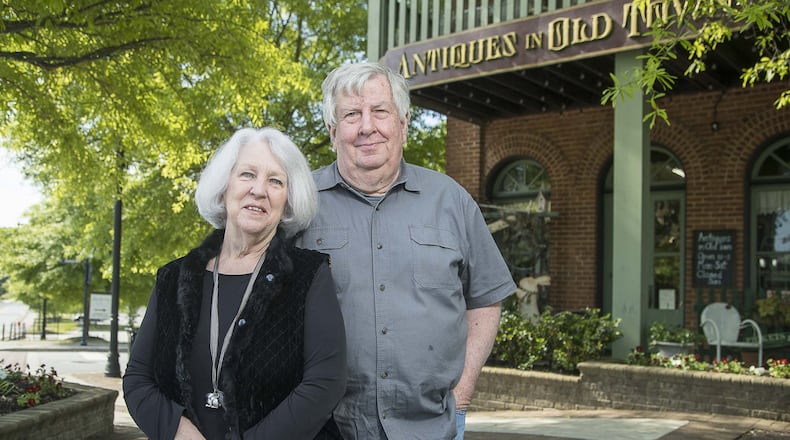For the small businesses ringing Main Street in one of metro Atlanta’s tiny downtowns, the last several weeks have been a test of will.
Scott Mecredy panicked that the pandemic could shutter his Music On Main Street, or MOMS, launched with money his mother gave him in her dying days. Nikki Fields Scott wondered how she'd pay both her mortgage and rent on Old Town Flowers & Gifts. Jonathan Hillyard agonized over which of his four employees, including a brother and niece, he would furlough first if his video production company, Connext Media, didn't get more orders soon.
» COMPLETE COVERAGE: Coronavirus in Georgia
Lilburn’s commercial core is a microcosm of how the coronavirus is pummeling Main Streets around the nation, threatening to flatten businesses and reverse years of downtown revitalization efforts. An antique shop, sports training academy, martial arts studio, special events space, hair salon and Mexican restaurant closed temporarily in Lilburn, where 10 of 11 small business owners interviewed by The Atlanta Journal-Constitution said the pandemic has cut their revenue.
But the Gwinnett County community of nearly 13,000 residents is also a petri dish of experiments — some successful — as entrepreneurs try to keep their businesses breathing until more customers venture out again. Like the local distillery that switched to making hand sanitizer. Or the farm-to-table restaurant that started selling toilet paper, yeast and bleach. Or the business that, after awful worries, has seen sales surge.
Gov. Brian Kemp is moving aggressively to reopen Georgia's economy. Everything from hair salons and gyms to bowling alleys and tattoo parlors were allowed to reopen Friday after being ordered shuttered in early April. On Monday, restaurants can reopen dining rooms and movie theaters can resume screenings. And a statewide "shelter in space" order for residents is set to expire after Thursday.
It's too early to tell when the state's Main Streets will fill up again, or if it will be quick enough that some businesses don't shutter for good. Public health experts are still cautioning Georgians to avoid close human contact. Businesses that are open must maintain safety measures.
“One thing I’ve become absolutely convinced of during this pandemic is that I don’t know what is going to happen,” said Betsey Dahlberg, who owns Hope Springs Distillery with her husband and has had to reinvent the business on the fly.
Mother’s Day flowers, short on rent, cramped salon
For years, Lilburn’s central core lagged other metro Atlanta suburban cities that rebuilt downtowns for a walkable mix of restaurants, quaint shops and homes.
More recently, things were looking up. Downtown shop spaces were rented out. The adjacent city park and greenway attracted crowds for Food Truck Tuesdays and free summer concerts.
In recent weeks, crews razed the former municipal court building and police station, making room for a possible play fountain, public gathering space and maybe restaurant. The first of more than 50 planned homes are under construction across the street at the Old Town Lilburn project, including plans for a coffee shop and another restaurant. A development for independent older adults is being built nearby.
The pandemic upturned everything. Events were postponed. Crews fenced off the playground at the city park. Few people strolled by shuttered shops.
Electrician Allan Cofer, whose family started in the same shop 56 years ago, saw a sudden dip in jobs. Three doors down, insurance agent Dan White said late payments on policies jumped 20%. Contractor Doug Mauk fretted after several construction projects were postponed, some indefinitely.
At Old Town Flowers, Scott said she was forced by a city emergency order to close her shop for two weeks, including during the crucial Easter holidays. Restrictions have since loosened but the 62-year-old owner, who learned the business working in her mom’s flower shop, now makes only deliveries.
She thinks it’s too early to reopen the store, concerned about the virus. She pours a bit of bleach in water for her flowers, hoping that will reduce the risk. She wears a mask and gloves and leaves the flowers outside customers’ doors.
Scott’s sales were cut in half in recent weeks as people worried about money and pandemic restrictions slowed demand for flowers at funerals and for people at hospitals and nursing homes. She worries about what will happen next month for Mother’s Day, normally her second busiest time after Valentine’s Day.
Her landlord told her to just pay what rent she can for now. Scott said she paid half what she owed.
“God blessed me all through the years,” she said. “Even through this he still blesses me, because I am getting orders.”
Lilburn has offered deferment of some business taxes, and the Downtown Development Authority excused rent for store owners leasing public property.
Hugh Wilkerson, whose wife Rowann owns Antiques in Old Town, helps manage nearby shopping space for another property owner. Four of the five shops there didn’t fully pay last month’s rent, he said, because they had closed during the pandemic.
The couple live above their 26-year-old shop on Main Street, in a building that is more than a century old. The shop and its narrow, overflowing aisles closed for more than a month. The couple expect it to survive. Still, “there’s a lot of businesses that probably will never come back,” predicted Wilkerson, who serves on the development authority.
Charlotte Kelley, co-owner of 97 Main Salon, said customers kept asking in recent weeks to sneak in a back door to have their hair done or get electrolysis to remove hair, a particularly up close procedure. She declined. She also opposed earlier petitions to allow salons to serve a single customer at a time, worrying about safety and logistics.
Now that salons can reopen under Kemp’s order, she’d still rather not, because she remains worried about safety. But she said she will reopen anyway — with numerous protections in place — because her workers need the money and rent is costly. “Financially we have to do it,” Kelley said.
Hand sanitizer, flour and 3D videos
At Hope Springs Distillery earlier this year, Dahlberg, a former attorney, was busy planning a new rose-flavored gin and an elderflower liqueur with her husband, Paul Allen, a former industrial engineer. Now in their third year of business, they had been ahead of schedule, expecting to break even soon.
Instead, with the arrival of COVID-19, sales runs were called off. Bars closed. Their distributor didn’t reorder cases of the distillery’s vodka, gin and absinthe.
The couple quickly decided to make alcohol-based hand sanitizer, including giving some to the city police department. Demand boomed for the eight-ounce bottles at $7 a pop. Early on they sparked a traffic jam down Railroad Avenue and around the corner onto Main Street, requiring police officers to direct the flow.
After 1,500 bottles of sanitizer, the couple is making hundreds more, rationing sales to people who email in advance and get confirmed time slots to stop by.
Still, overall sales remain down.
“Some nights it is real hard,” she said. “Some nights I say, ‘What the hell.’ A lot of people have worse problems.”
Jennifer and Tony Tiberia’s 1910 Public House, a farm-to-table restaurant, had almost no delivery or takeout sales before the pandemic struck. They went from Friday and Saturday nights with typical hour-plus waits to worrying about how they could make payroll, which can hit $65,000 a month between their two restaurants, including Sprig in Decatur.
First, they consolidated menus, shortened operating hours and devised more family-oriented meals for takeout. Then they became mini-grocers after realizing customers needed products hard to find in grocery stores but available through restaurant suppliers. Among the offerings: paper towels, latex gloves, flour and uncooked ground beef and chicken breasts.
The restaurant’s sales are off by 50%, but many staffers are getting shifts again, including former waiters making deliveries.
Before the coronavirus, Tiberia had planned to open a coffee shop and another restaurant across Main Street. But she’s having second thoughts, worried that consumers will be slow to return to eating near strangers.
While Kemp’s order permits the resumption of in-dining, the couple has leaned toward staying focused on takeout, but allowing people who pick up their meals to eat them on an outdoor patio, with no waiter present.
Mecredy, who owns MOMS, had to stop holding concerts in his backyard amphitheater. The first show of the season was supposed to be Saturday. It’s unclear when concerts will resume; live entertainment venues still aren’t allowed to reopen.
Mecredy, though, who opened his business nine years ago, was stunned that 80% of MOMS students taking music lessons agreed to switch to online classes. That has kept the enterprise afloat.
Jonathan Hillyard is one of the few — if not the only — business owners in downtown Lilburn who can claim rising sales amid the pandemic. His three-year-old Connext Media was mostly focused on serving local real estate agents, and he worried he would have to furlough staff.
But while some work dried up, Hillyard said he saw an even bigger surge from real estate agents interested in 3D virtual tours of homes. With open houses and showings put on hold, the videos offered prospective homebuyers another way to look inside. Business at his video production company jumped 30% in one month, he said.
He knows others haven’t been as fortunate. He said his mother was laid off from a job after 30 years at a home décor showroom inside AmericasMart. She got a week’s severance. His drive to work is also eye-opening.
The scene in downtown Lilburn has been “kind of eerie.” For many businesses, he added,“everything is on pause.”
About the Author
Keep Reading
The Latest
Featured










